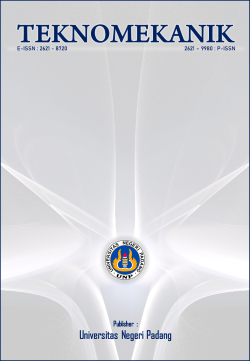Evaluation of learning program subjects for building utility systems based on facilities and infrastructure standards using the CIPPO model at SMK N 2 Banda Aceh
DOI:
https://doi.org/10.24036/jptk.v5i1.24723Keywords:
Evaluation, Learning Programs, CIPPO, Facilities and InfrastructureAbstract
Based on interviews at SMK Negeri 2 Banda Aceh in 2021, obtained from 25 students, 4 people did not pass the skills test in the subject of building utility systems, with an average knowledge score of 79.2 and an average skill score of 78.4 One of the factors is the inadequate infrastructure in carrying out the learning process, especially practicum learning. The purpose of the study was to evaluate the learning process of building utility system subjects in the Construction and Property Engineering Expertise Program using the CIPPO model at SMK Negeri 2 Banda Aceh City. This research is an evaluation research using the CIPPO model, namely the evaluation of the context, input, process, product and outcome. The type of research is a mixed method with Concurrent Triangulation Strategy. Sources of qualitative data were obtained from the Principal, Deputy Principal of the School of Facilities and Infrastructure, Head of the Construction and Property Engineering Expertise Program, Head of Lab and 5. Teachers who teach building utility systems at SMK Negeri 2 Banda Aceh. Quantitative data were taken from 40 students of class XII and XIII. The results showed that the context component was in the sufficient category (73.59%), the Input component was in the sufficient category (75.69%), the process component was in the sufficient category (72.01%), the Product component was in the sufficient category (66.5 %), and the outcome component is also in the sufficient category (73.25%). Because all components are in the sufficient category, it is recommended to make appropriate improvements to improve student achievement abilities in the subject of building utility systems in the Construction and Property Engineering Expertise Program at SMK Negeri 2 Banda Aceh.
Downloads
References
Akpur,U., Alci, B., & Karatas, H. (2016). Evaluation of the curriculum of English preparatory classes at Yildiz Technical University using CIPP model. Academic Journals, 11(7), 466-473. doi: 10.5897/ERR2016.2638
Aslan,D., & Gunay, R. (2016). An Evaluation of High School Curricula Employing Using the Element-based Curriculum Development Model. Journal of Education and Training Studies, 4(7), p-2324-805X, e-2324-8068. doi: 10.11114/jets.v4i7.1477
Ernawaty, Waskito, Wakhinuddin & Maksum, H. (2021). Relationship Of Students' Perceptions On Vocational Education And Career Information On Learning Outcomes Students Of SMKN 2 Padang. International Journal of Educational Dynamics, 3(2), p-2655-4852, e-2655-5093.
Hanif, H., Maksum, H., Irfan, D., & Wakhinuddin. (2021). Evaluasi Pembelajaran Daring Dismk Negeri 1 Sumatera Barat. Jurnal Education and development Institut Pendidikan Tapanuli Selatan, 9(2), p-2527-4295, e-2614-6061.
Ikawati, A. (2018). Pengelolaan Sarana Dan Prasarana Pembelajaran Produktif Di SMK Negeri 3 Makassar. Tesis. Program Pascasarjana Universitas Negeri Makassar.
Kemendikbud. (2017). Revitalisasi SMK: Mendongkrak Unggulan Nasional. Retrieved from https://psmk.kemdikbud.go.id/konten/2637/revitalisasi-smk-mendongkrak-unggulan-nasional
Kompri. (2015). Manajemen Pendidikan 3, Penerbit Alfabeta, Bandung.
Permendikbud RI 2018 No.34, Standar Sarana dan Prasarana Sekolah Menengah Kejuruan/ Madrasah Aliyah Kejuruan (SMK/MAK)
Nurfaizah, Y & Sukiman. (2021). Evaluasi Kurikulum Dengan Model Cippo Di Lembaga PAUD. Jurnal Riset Golden Age PAUD UHO, 4(1), p-2615-6768, e-2615-5664
Oktarina, R. (2016). Evaluasi Sarana dan Prasarana Pembelajaran Jurusan Teknik Komputer Jaringan Menggunakan Model CIPP di SMK Negeri 2 Payakumbuh. Jurnal Sistem Informasi dan Manajemen, 4(2), p-2338-1523, e-2541-576X
Sadrina & Nasir, M. I, M. (2017). Penilaian Pelaksanaan Kegiatan Pembelajaran di SMK Bidang Teknik (Sebuah Kajian Observasi). Jurnal Ilmiah Pendidikan Teknik Elektro, 1(2), 179-184, p- 2549-3698, e-2549-3701
Veri, S. M., Jalinus, N., Maksum, H., Edi, I. P., Jamilah, Y. (2019). The Effect Of Learning Discipline On Learning Achievement Of Class X Students In Vocational High School 5 Padang. International Journal of Educational Dynamics, 2(1), p-2655-4852, e-2655-5093
Downloads
Published
Issue
Section
License
Copyright (c) 2022 Dian Ahzaliza, Hasan Maksum, Wakhinuddin Wakhinuddin, Eko Indrawan

This work is licensed under a Creative Commons Attribution 4.0 International License.





